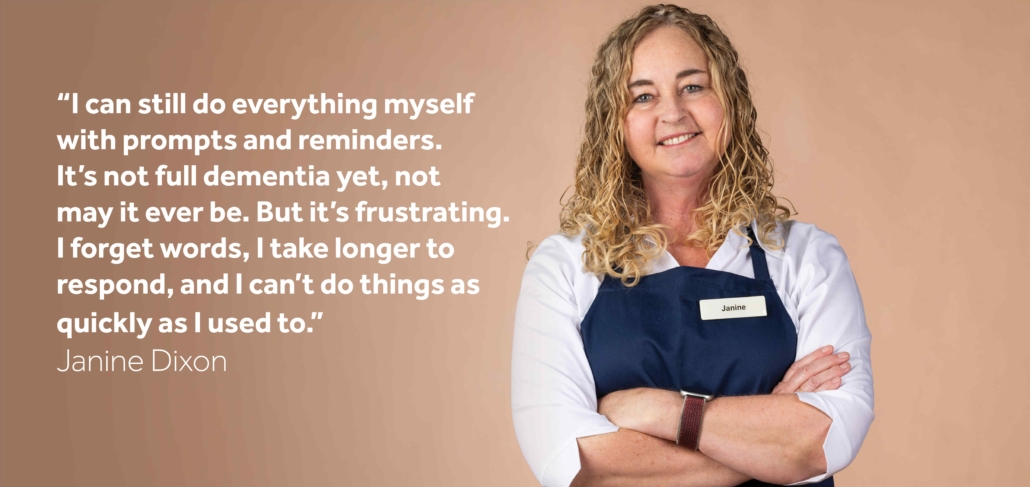Living with Young Onset Dementia
For Janine Dixon, a medical laboratory scientist from Hamilton, life took an unexpected turn when she was diagnosed with mild cognitive impairment three years ago at the age of 51. Though not yet full-blown dementia (and may not become so), her condition has forced her to make significant changes in both her personal and professional life.
Similar to young onset dementia, this form of cognitive decline typically affects people under the age of 65 and disrupts lives in ways that are still widely misunderstood.
Janine had to step down from her senior role, which once saw her training junior staff, and has since transitioned into a position with less responsibility.
“I can still do everything myself with prompts and reminders,” she explains, adding that while the changes were initially hard to accept, she has adapted. “It’s not full dementia yet, not may it ever be,” she says, “but it’s frustrating. I forget words, I take longer to respond, and I can’t do things as quickly as I used to.”
Despite these challenges, Janine is grateful for the support she has received from her employer. Her workplace made adjustments, allowing her to continue working even after the diagnosis.
“It’s strange to find myself asking junior staff questions when I used to train them,” she admits. However, the reduced pressure has helped her cope with the reality of her condition.
Janine’s story is far from unique, but it illustrates the broader challenges faced by those living with young onset dementia and other cognitive impairments. There is often a misconception that dementia is solely an elderly person’s condition. This misunderstanding can lead to a lack of support or recognition of the condition among employers and communities, leaving those diagnosed feeling isolated and misunderstood.
“There’s a stigma,” Janine says. “People think dementia and cognitive impairment means you can’t function, but I can still do a lot, just differently.”
This sentiment is echoed by Janine Appleby, Senior Dementia Advisor at Dementia Waikato, who has spent years working closely with people affected by dementia and their families.
“One of the biggest challenges is awareness,” Appleby says. “We need to create communities that are more accepting and supportive of people with cognitive impairments. These individuals can still live full and meaningful lives with the right support.”
Dementia Waikato is instrumental in providing some of that support, offering one-on-one guidance and running local groups for those with dementia and their care partners. However, Appleby points out that their resources are limited.
“We cover a large area with only four part-time dementia advisors,” she says. “And we rely heavily on grants and donations, receiving only about 50% of our funding from Te Whatu Ora.”
The challenges faced by Dementia Waikato are indicative of a broader issue; across New Zealand, dementia services are underfunded, despite the growing need for them.
The Restaurant That Makes Mistakes, which highlights the challenges faced by people with young-onset dementia, returns to our screens this week.
The TVNZ show follows ten volunteers primarily all with young onset dementia. The volunteers, who include professionals from a variety of fields, demonstrate that a dementia or cognitive impairment diagnosis doesn’t mean an end to contributing to society.
“It was an amazing experience,” Janine recalls, speaking about her time on the show. “I felt useful and valued, and the atmosphere was so supportive. It was like finding a new tribe, a group of people who understood exactly what I was going through.”
The show is just one part of a broader effort to raise awareness and combat the stigma surrounding dementia. As Appleby points out, “There is still a lot of rigid thinking about what dementia is and what people with dementia are capable of.”
As New Zealand’s population ages, the number of people living with dementia is expected to rise dramatically. Currently, around 70,000 New Zealanders are living with dementia, and that number is set to increase as the population ages.
While there is no cure, early diagnosis and appropriate support can significantly improve the quality of life for those affected.
Janine’s story highlights the importance of fostering understanding and compassion for those living with dementia. And as initiatives like The Restaurant That Makes Mistakes continue to break down misconceptions, there is hope that more communities will become dementia-friendly, allowing individuals like Janine to live their best possible lives.
You can make a difference
No family should have to go through their dementia journey alone. Your generous gift today can help us provide life-changing resources, education, and local community support services – to give help and hope to people living with dementia.
With your gift, we can be there to support families like Lois’s along their dementia journey. You’re gift is not just helping people with dementia | mate wareware, you’re making a difference for dementia communities across Aotearoa.



